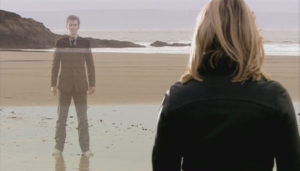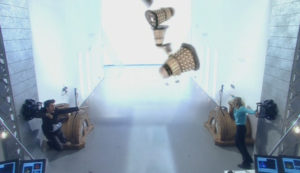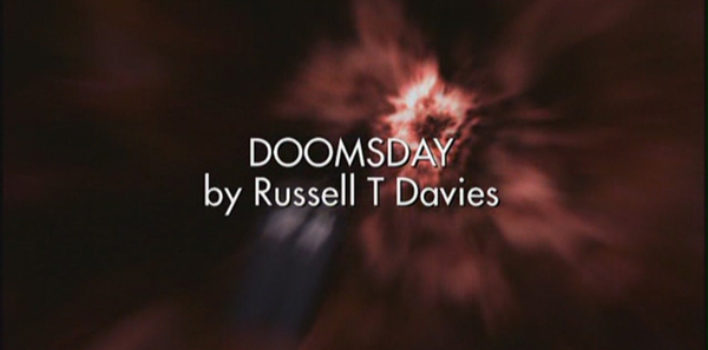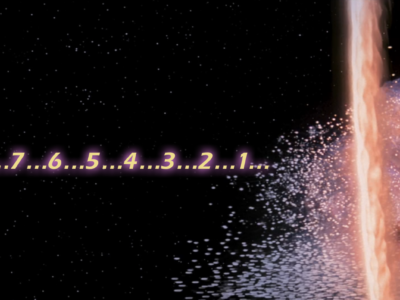Who-ology| S02E13 Doomsday
 As noted in last month’s Who-ology, the Christian narrative starts with the distortion of truth in the Garden of Eden: with good being called evil, and light being called darkness (Isaiah 5:20, Genesis 3:4,5). That is the beginning of the story we call Gospel. What follows is the history of man’s enslavement to sin and God’s unfathomable, incredible plan to rescue him.
As noted in last month’s Who-ology, the Christian narrative starts with the distortion of truth in the Garden of Eden: with good being called evil, and light being called darkness (Isaiah 5:20, Genesis 3:4,5). That is the beginning of the story we call Gospel. What follows is the history of man’s enslavement to sin and God’s unfathomable, incredible plan to rescue him.
Let’s begin with the end of episode 13: great sacrifice. You heard me. Unbridgeable time and space between the Doctor and Rose. Forever. Once again, they choose to face certain doom for the good of the whole: to be the heroes, right the wrong. And this time, there is no wacky narrow escape. No reversal that gives us a happy ending. The consequences are extreme, final, irreversible.
How did we get here?
There is death happening all around the universe at the hands of the Cybermen and the Daleks—their presence is destroying not just one world, but the “Void” through which they arrived is destabilizing other universes by fracturing the space between them. This Void is a “nothing” space also known as hell.
While the Void has made a way for bad things to pass between worlds, the “cracks” it’s created also allow the entry of good people from another universe—including Mickey and Rose’s dad (see season 2, episodes 5 & 6), Pete. They’ve tracked the Cybermen to Rose and the Doctor’s universe and have come to join the fight.
 The Doctor works out how to close this “door” once and for all. All things that have traveled through the Void have a kind of magnetic residue on them, and he can rig the equipment at Torchwood to pull into the Void anything covered in that residue, including the door to the Void itself. It will literally “eat” itself, sealing off forever. Unfortunately, he, Rose and other principal characters have also traveled through the Void so they are at risk of being pulled in too.
The Doctor works out how to close this “door” once and for all. All things that have traveled through the Void have a kind of magnetic residue on them, and he can rig the equipment at Torchwood to pull into the Void anything covered in that residue, including the door to the Void itself. It will literally “eat” itself, sealing off forever. Unfortunately, he, Rose and other principal characters have also traveled through the Void so they are at risk of being pulled in too.
Mickey, Pete, and even Jackie are sent back to the parallel universe to be kept safe from what is about to happen. The Doctor tries to send Rose, too. But she won’t have it.
Rose: “I made my choice a long time ago, and I’m never going to leave you. So what can I do to help?”
The Doctor spends his life being the hero at great cost to himself. Loneliness is his greatest enemy. He is used to a series of co-travelers who come and go, who are often drawn in only by what he can give to them, and easily scared off by the kind of risk and sacrifice that define his lifestyle. But in Rose he has found true soul-companionship: she is his advocate, his champion–she cares about his needs, but also challenges him; she throws herself into adventure as he does, a worthy partner who helps when needed but can act independently, too; she has fully embraced and lives into the Doctor’s values: putting others before herself, valuing life and being the first to stand up to injustice or evil.
Here in episode 13, our hearts are warmed as she firmly reminds the Doctor that she has chosen to spend the rest of her life with him and she’s not going anywhere, proving her commitment once again by running headlong into danger, come what may.
As they enact the Doctor’s plan to save the world, a mishap leads to Rose being pulled towards the Void with the Doctor helpless to intervene. Just before the parallel universes are sealed off from one other, Pete is able to pull Rose into his world, saving her life but permanently cutting her off from the Doctor.
And so follows one of the most heart-wrenching moments of Doctor Who. The two stand on opposite sides of a wall once connected by the Void, trying to reach out to one another, in shock. This forever separation of the Doctor and Rose is akin to death.
 The world was out of options; riddled with death and enslavement, though they were fighting for their lives, more violence was only taking humanity more hastily to the end. A great sacrifice of love was the only thing that could save the world. The Doctor was willing to make this sacrifice—he always is—but he could not do it alone: there were two levers on opposite sides of the room that had to be pulled for the plan to work. Though he needed Rose, he demanded nothing of her. She made her own decision, knowing full well the cost.
The world was out of options; riddled with death and enslavement, though they were fighting for their lives, more violence was only taking humanity more hastily to the end. A great sacrifice of love was the only thing that could save the world. The Doctor was willing to make this sacrifice—he always is—but he could not do it alone: there were two levers on opposite sides of the room that had to be pulled for the plan to work. Though he needed Rose, he demanded nothing of her. She made her own decision, knowing full well the cost.
How could this sacrifice not call to mind the One who came into our world knowing he must be cut off from his Heavenly Father in order to save us—people who stupidly, willingly, irreparably relinquished our freedom to Evil’s mastery? We didn’t deserve such a beautiful sacrifice. We let evil into our homes and our lives. We chose to surrender to it, and so we belonged to it, going where it goes, even if that place was the Void. To break our chains–to buy us back–Jesus willingly joined God’s plan at great cost to himself. Our enslavement was not his fault, not God’s fault, but we had given up all of our assets. Our freedom had to come at the hand of someone who still had their riches and was willing to give them up to buy us back.
This story of selfless sacrifice repeats itself in human art. It doesn’t get old. We are amazed and confounded by it. It compels us, moves us, makes us wonder, leaves us speechless. It seems so illogical, and yet time and again, we come back to it because the transforming power of sacrifice transcends any other response. When violence or greed or fear or self-protection only compound and perpetuate the same old problems, willing sacrifice is so other that it creates something entirely new.







